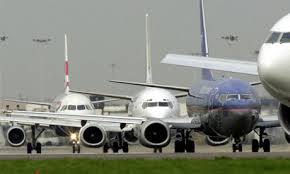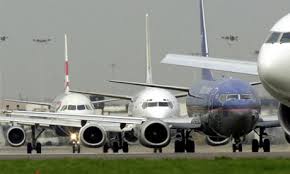
The aerospace industry is well placed to perform well in the short term but the worrying factors for the industry are the looming interest rate hikes and fuel price volatility, feel executives from the industry.
This is the overwhelming outcome of a research survey by CIT Aerospace titled “2015 Aerospace Outlook” conducted by Harris Poll among 100 airline fleet and finance executives. CIT Aerospace is a global leader in aircraft finance and a division of CIT Group Inc.
“Airline executives are taking advantage of current interest rate levels and low fuel prices to reduce ticket prices, invest in technology and increase their fleet utilization. They are taking advantage of current interest rate levels and low fuel prices to reduce ticket prices, invest in technology and increase their fleet utilization,” said Jeff Knittel, President of CIT Transport and International Finance.
“However, they realize that the market is changing and many are preparing for future challenges around fuel price volatility, increased competition and rising interest rates. In fact, 63% believe higher interest rates will change their company’s views on purchasing new aircraft and 65% indicate that these higher rates will cause them to increase the lease content of their fleet,” Knittel said.
This on-line study was conducted from February to May 2015 and included executives form the fleet and finance departments of 100 commercial airline. The bulk of the airlines chosen operated primarily in Europe and North America.
The executives also feel that the airline industry needs o prepare for the impending rise in the interest rates. There was an overwhelming feeling that the rise in the interest rates would be to the tune of 1% within the next two years which would result in the airlines paying more for financed aircraft as interest rates rise.
Contrary to the fears of strain o the airlines expressed by the executives, nearly three quarters of the executives surveyed said that the price volatility will have a positive impact or no impact on their plans to acquire new technology aircraft. Not many expect
fuel prices to increase in the next 18 months but more than 80 percent of the respondents were of the opinion about the rise of fuel prices within the next three years.
As far as the strategies of the airlines with respect to decline in the fuel prices are concerned, hedging at current fuel prices, reducing ticket prices and increasing utilization of their current fleet are the major activities that the executives believe would positively impact the bottom line of global and regional airliners.
Most of the executives were of the opinion that used aircraft in the 130-seat category will be in high demand in the next 10 years due to the current lack of new units in the same seat category. The single biggest positive impact on individual airlines would be made by innovations in technology, say that executives, in the next five years as airlines set up strategic alliances in order to capture more market share and share routes. In flight internet connectivity is one such technological innovation that the executives are hopeful would positively impact airlines implementing them.
The study concluded that the airline executives bear a optimistic attitude for the induttry in the short term.
(Source:www.businesswire.com )
This is the overwhelming outcome of a research survey by CIT Aerospace titled “2015 Aerospace Outlook” conducted by Harris Poll among 100 airline fleet and finance executives. CIT Aerospace is a global leader in aircraft finance and a division of CIT Group Inc.
“Airline executives are taking advantage of current interest rate levels and low fuel prices to reduce ticket prices, invest in technology and increase their fleet utilization. They are taking advantage of current interest rate levels and low fuel prices to reduce ticket prices, invest in technology and increase their fleet utilization,” said Jeff Knittel, President of CIT Transport and International Finance.
“However, they realize that the market is changing and many are preparing for future challenges around fuel price volatility, increased competition and rising interest rates. In fact, 63% believe higher interest rates will change their company’s views on purchasing new aircraft and 65% indicate that these higher rates will cause them to increase the lease content of their fleet,” Knittel said.
This on-line study was conducted from February to May 2015 and included executives form the fleet and finance departments of 100 commercial airline. The bulk of the airlines chosen operated primarily in Europe and North America.
The executives also feel that the airline industry needs o prepare for the impending rise in the interest rates. There was an overwhelming feeling that the rise in the interest rates would be to the tune of 1% within the next two years which would result in the airlines paying more for financed aircraft as interest rates rise.
Contrary to the fears of strain o the airlines expressed by the executives, nearly three quarters of the executives surveyed said that the price volatility will have a positive impact or no impact on their plans to acquire new technology aircraft. Not many expect
fuel prices to increase in the next 18 months but more than 80 percent of the respondents were of the opinion about the rise of fuel prices within the next three years.
As far as the strategies of the airlines with respect to decline in the fuel prices are concerned, hedging at current fuel prices, reducing ticket prices and increasing utilization of their current fleet are the major activities that the executives believe would positively impact the bottom line of global and regional airliners.
Most of the executives were of the opinion that used aircraft in the 130-seat category will be in high demand in the next 10 years due to the current lack of new units in the same seat category. The single biggest positive impact on individual airlines would be made by innovations in technology, say that executives, in the next five years as airlines set up strategic alliances in order to capture more market share and share routes. In flight internet connectivity is one such technological innovation that the executives are hopeful would positively impact airlines implementing them.
The study concluded that the airline executives bear a optimistic attitude for the induttry in the short term.
(Source:www.businesswire.com )





